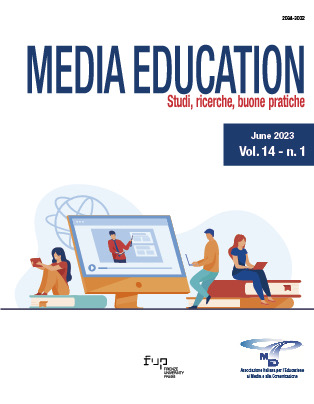How teacher training on analytic philosophy can help schools in developing a decommodified interpretation of coding activities
Published 2023-01-30
Keywords
- Coding,
- Computational Thinking,
- Analytic Philosophy,
- Logic,
- Teacher Training
Copyright (c) 2023 Margherita Di Stasio, Beatrice Donati, Matteo Bianchini

This work is licensed under a Creative Commons Attribution-NonCommercial-NoDerivatives 4.0 International License.
Abstract
The term ‘coding’ is used to label a wide range of learning activities directly or indirectly related to the design and implementation of algorithmic procedures. These activities are now widespread in all levels of schools and are performed in very different pedagogical frameworks. Our hypothesis is that teachers look at coding from a perspective strongly influenced by their background. In particular, we deem that a logical and philosophical training may foster a de-commodified vision of coding and computational thinking. We have therefore decided to design and experiment a teacher training path that provides participants with some basics of logic and analytical philosophy. We analysed if and how this kind of training influences classroom coding activity. In the first part of this contribution (Sections 1 to 3) we introduce the theoretical framework underlying our hypothesis as well as the training and educational activities proposed to teachers. In the second part (Sections 4 to 7), we present the results of this path by means of a comparative case study focusing on the coding practices implemented in the experiences.
References
Calvani, A., Ranieri, M. & Bonaiuti, G. (2007). Fondamenti di didattica: teorie e prassi dei dispositivi formativi. Roma: Carocci.
Cantini, A., & Minari, P. (2019). Introduzione alla logica: Linguaggio, significato, argomentazione. Firenze: Le Monnier.
Csizmadia, A., Curzon, P., Dorling, M., Humphreys, S., Ng, T., Selby, C., & Woollard, J. (2015). Computational thinking. A guide for teachers. Retrieved from: https://eprints.soton.ac.uk/424545/1/150818_Computational_Thinking_1_.pdf.
Davis, M. (2000). The Universal Computer: The Road from Leibniz to Turing. New York: W. W. Norton and Company.
del Vado Vírseda, R. (2019). Computability and Algorithmic Complexity Questions in Secondary Education. In Proceedings of the ACM Conference on Global Computing Education (CompEd ‘19). Association for Computing Machinery, 51–57.
Design-Based Research Collective (2003). Design-based research: An emerging paradigm for educational inquiry. Educational Researcher, 32(1), 5-8.
Floridi, L. (2015). The Onlife Manifesto: Being Uuman in a Hyperconnected Era. Springer Open.
Floridi, L. (2014). The fourth revolution: How the infosphere is reshaping human reality. Oxford: Oxford OUP.
Frison, D. (2019). Educational robotics in the early childhood settings 0-6: a systematic review. Form@re - Open Journal Per La Formazione in Rete, 19(1), 30-46.
Gabbay, D. M., Woods, J., & Kanamori, A. (2004). Handbook of the history of logic. Amsterdam: Elsevier.
Law, N., Woo, D., de la Torre, J., & Wong, G. (2018). A global framework of reference on digital literacy skills for indicator 4.4. 2. Montreal: Unesco Institute for Statistics.
Maccario, D. (2010). A scuola di competenze. Brescia: SEI.
Mason, S. L. & Rich, P. J. (2019). Preparing elementary school teachers to teach computing, coding, and computational thinking. Contemporary Issues in Technology and Teacher Education, 19(4), 790-824.
Merriam, S.B. (1998). Qualitative Research and Case Study Applications in Education. Revised and Expanded from “Case Study Research in Education”. San Francisco: Jossey-Bass.
MIUR (2018). Indicazioni nazionali e nuovi scenari. Retrieved form: https://www.miur.gov.it/documents/20182/0/Indicazioni+nazionali+e+nuovi+scenari/3234ab16-1f1d-4f34-99a3-319d892a40f2.
Nilson, L. B. (2010). Teaching at its best: A research-based resource for college instructors. San Francisco: Jossey-Bass.
OECD (2019). OECD Learning Compass 2030 - Concept Note Series. Retrieved from: https://www.oecd.org/education/2030-project/contact/OECD_Learning_Compass_2030_Concept_Note_Series.pdf.
Papert, S. (1980). Mindstorms. Basic Book, New York.
Tessaro, F. (2014). Compiti autentici o prove di realtà?. FORMAZIONE & INSEGNAMENTO. Rivista internazionale di Scienze dell'educazione e della formazione, 12(3), 77-88.
Wing, J. M. (2006). Computational Thinking. Communication of ACM, 49(3), 33-35.
Yin, R. K. (2009). Case study research: design and methods. New Delhi: SAGE Publications.

